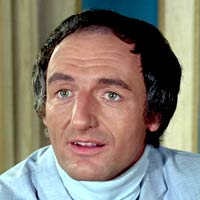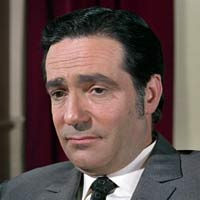|
|
|


|
 |
|
Image © ITV Studios, 1969 |
| |
Jeremy Young
Character & Episode:
Douglas Kershaw in You Can Always Find a Fall Guy
Born: 28/07/1934, Liverpool, Merseyside, England
Died: 09/04/2022, Chelsea, London
Of Scottish descent, Jeremy
Young was a much-employed character actor for more almost fifty years
who made significantly more than one hundred television and film appearances.
His first choice of career was medicine, which he studied for
three years, and when he chose instead to become an actor his
decision was met with family opposition. He first developed a
serious interest in acting and the stage while on National
Service, during which time he directed and organised plays. On
his return to civilian life, he was soon offered a job in
journalism, but decided not to expect it, preferring to get into
professional theatre in Peterborough. However, he was rejected
due to a lack of experience. He remained in the city and, in
order to earn a living, became a furniture salesman. Soon, in
early 1955, he responded to an announcement in The Stage
newspaper and this led to employment in the theatre as an actor
and assistant stage manager. Later, he was a founder member of
the original Renaissance Theatre Company. He
first appeared on screen in the late 1950s and would work in
television for the greater proportion of his
career.
During the Sixties, he appeared on numerous shows and is
perhaps best remembered for his role as Athos in the BBC serials
The Three Musketeers (1966-1967) and The Further Adventures of the
Musketeers (1967). Other contributions during the
decade included a regular role in Deadline Midnight (1960-61), and guest turns in The Avengers (A Touch of
Brimstone, Never, Never Say Die and The
Forget-Me-Knot), The Saint (The Man Who Liked Lions
and The Ex-King of Diamonds) and Z Cars. He is
also notable as being one of the main supporting actors in the
first Doctor Who serial transmitted in late 1963. He
would appear in the series once again in 1965 in Mission to
the Unknown, which is unique in that it is the only episode
of the series not to feature the Doctor or any of the regular
characters, being a one-episode scene-setter for an epic Dalek
story, The Daleks' Master Plan. Jeremy
also appeared in the soap operas Crossroads (as
Professor Angrave), Coronation Street (1972, as Benny
Lewis) and EastEnders (1988-89, as Officer Stone). His
screen appearances became more infrequent after the Seventies and he made his final
television appearance in the drama The Debt in 2003.
In his personal life, Jeremy was first
married to actress Coral Atkins (1936-2016) and later, from 1971
to 1976, to actress Kate O'Mara (1939-2014), another familiar
face on British television. In his later years, Jeremy worked for
BBC Radio and for a long time taught and directed at the Court Theatre
Training Company, which is part of the Courtyard, London.
|
|
 |
|
Image © ITV Studios, 1969 |
| |
Raymond Young
Character & Episode:
Rawlings in But What a Sweet Little Room
Born: 16/06/1918, London, England (as Raimondo
Jaquarello)
Died: 27/07/2011, Littlehampton, West Sussex, England
Raymond Young was a supporting actor with
more than one hundred film and television credits to his name.
He started his professional acting career in the 1930s. During
the Second World War, he was a flight control officer in RAF. He
broke into television with the BBC in second half of 1940s, and
in this decade he appeared in such productions as British
Justice, Lady Luck and She Stoops to Conquer.
His first big screen part came when he was cast as Roddy Black
in Adam and Evelyne (1949), a romance film, and it was at
around this time that he adopted the stage name Raymond Young.
In 1952, Raymond played the regular role of
the Marquis de la Tour du Pin in the television serial The
Three Hostages, which was based on John Buchan's famous
Richard Hannay stories. Throughout the remainder of the 1950s,
Raymond proved to be much in demand, appearing in some notable
television series such as The Adventures of Charlie Chan,
Ivanhoe and The Vise. During the Sixties, he
continued to appear regularly in many television series, making
valuable contributions to Emma, Biggles and
Seven Deadly Sins. He also had an uncredited role in the
James Bond film Goldfinger (1964) and featured in
well-remembered genre series such as Mr. Rose (1968),
Department S (1969), Callan (1969) and The
Persuaders! (1971). As the Eighties approached, his
appearances became scarce and he made his last in Jeeves and
Wooster in 1991. He also appeared in radio productions.
In his personal life, Raymond was first
married to Elsie Pamela Johnson (1917-1996) and they had son,
Roland (born in 1945), who became a theatre director and radio
producer/director. Raymond's second marriage was to actress
Diana Calderwood (1927-2020).
|
Section compiled by Darren Senior
Additional research and presentation by Denis Kirsanov and Alan Hayes
|
|
|
Back to Top |
|